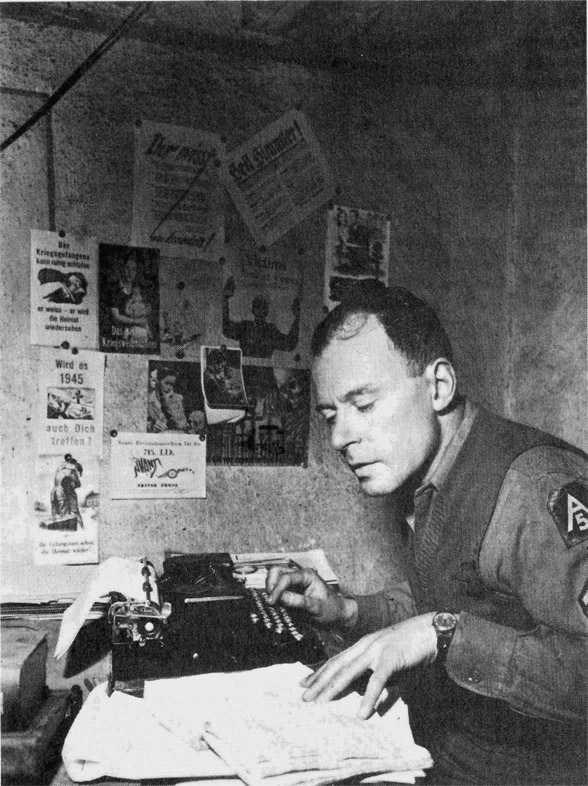- Klaus Mann
Infobox Writer
name = Klaus Mann
imagesize = 250px
caption = Klaus Mann, Staff Sergeant 5th US Army, Italy 1944
pseudonym =
birthdate = birth date|1906|11|18
birthplace =Munich ,Germany
deathdate = death date and age|1949|5|21|1906|11|18
deathplace =
occupation = Novelist
Short story writer
genre =Satire
movement =
relatives =Thomas Mann (father)
Katia Pringsheim (mother)Erika Mann (sister)
see full family tree
influences =
influenced =
website =Klaus Mann (
November 18 ,1906 –May 21 ,1949 ) was a Germanwriter .Life and work
Born in
Munich , Klaus Mann was the son of German writerThomas Mann and his wife, Katia Pringsheim. His father was baptized as a Lutheran, while his mother was from a family of secular Jews. He began writing short stories in 1924 and the following year became drama critic for a Berlin newspaper. His first literary works were published in 1925. Mann's early life was troubled. Hishomosexuality often made him the target ofbigotry , and he had a difficult relationship with his father, who had little respect for him. After only a short time in various schools, [Nicole Schaenzler: "Klaus Mann", P. 30] he travelled with his sisterErika Mann , a year older than himself, around the world, and visited the US in 1927. In 1924 he had become engaged to his childhood friend Pamela Wedekind, the eldest daughter of the playwrightFrank Wedekind , who was also a close friend of his sister Erika. The engagement was broken off in January 1928.He travelled with Erika to North Africa in 1929. Around this time they made the acquaintance of
Annemarie Schwarzenbach , a Swiss writer and photographer, who remained close to them for the next few years. Klaus made several trips abroad with Annemarie, the final one to a writers' congress in Moscow in 1934. [Nicole Schaenzler: "Klaus Mann", P. 302]In 1932 Klaus wrote the first part of his autobiography, which was well received until Hitler came to power. [Nicole Schaenzler: "Klaus Mann", P. 211] In 1933 Klaus participated with Erika in a political cabaret, the "Pepper-Mill", which came to the attention of the Nazi regime. To escape prosecution he left Germany in March 1933 for Paris, later visiting Amsterdam and Switzerland, where his family had a house. In November 1934 Klaus was stripped of German citizenship by the Nazi regime. He became a Czechoslovak citizen. In 1936, he moved to the
United States , living inPrinceton, New Jersey andNew York . In the summer of 1937, he met his partnerThomas Quinn Curtiss , who was later a longtime film and theater reviewer for "Variety" and the "International Herald Tribune ". Mann became a US citizen in 1943.During
World War II , he served as a Staff Sergeant of the 5th US Army in Italy and in summer 1945 he was sent by the "Stars and Stripes" to report from Postwar-Germany.Mann's most famous novel, "Mephisto", was written in 1936 and first published in Amsterdam. The novel is a thinly-disguised portrait of his former brother-in-law, the actor
Gustaf Gründgens . The literary scandal surrounding it made Mann posthumously famous in West Germany, as Gründgrens' adopted son brought a legal case to have the novel banned after its first publication in West Germany in the early 1960s. After seven years of legal hearings, the West German Supreme Court banned it by a vote of three to three, although it continued to be available in East Germany and abroad. The ban was lifted and the novel published in West Germany in 1981.Mann's novel "Der Vulkan" is one of the 20th century's most famous novels about German
exile s during WWII.He died in
Cannes of an overdose of sleeping pills. He was buried there in theCimetière du Grand Jas .Selected bibliography
*"Der fromme Tanz", 1925
*"Anja und Esther", 1925
*"Revue zu Vieren", 1927
*"Kind seiner Zeit", 1932
*"Treffpunkt im Unendlichen", 1932
*"Journey into Freedom", 1934
*"Symphonie Pathétique", 1935
*"Mephisto", 1936
*"Der Vulkan", 1939
*"The Turning Point", 1942
*"André Gide and the Crisis of Modern Thought", 1943ee also
*
Dohm-Mann family tree External links
* [http://www.muenchner-stadtbibliothek.de/page.php?pageid=8&na_id=266&costart=1&cosearch=klaus+mann The Works, Diaries and Letters are in the Munich Literatur-Archiv "Monancensia"]
References
* Nicole Schaenzler: "Klaus Mann. Eine Biographie." Campus Verlag, Frankfurt – New York 1999, ISBN 3-593-36068-3
Wikimedia Foundation. 2010.
